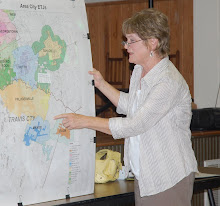Interesting explanation from Real Clear Politics--the reasons that high-speed rail is not a good idea for this country.
http://www.realclearpolitics.com/articles/2009/08/24/high-speed_boondoggle_97999.html
The comments on public funds and subsidized tickets for a very few commuters and travelers also apply to Austin's venture into light rail.
A few quotes:
"The Obama administration's enthusiasm for high-speed rail is a dispiriting example of government's inability to learn from past mistakes. Since 1971, the federal government has poured almost $35 billion of subsidies into Amtrak with few public benefits. At most, we've gotten negligible reductions -- invisible and statistically insignificant -- in congestion, oil use or greenhouse gases. What's mainly being provided is subsidized transportation for a small sliver of the population."
"Given this, you'd think even the dullest politician wouldn't expand rail subsidies, especially considering the almost $11 trillion of projected federal budget deficits between now and 2019. But no, the administration has made high-speed rail a top priority. It's already proposed spending $13 billion ($8 billion in the "stimulus" package and $1 billion annually for five years) as a down payment on high-speed rail in 10 "corridors," including Philadelphia to Pittsburgh and Houston to New Orleans."
"President Obama's network may never be built. Its doubtful private investors will advance the money and once government officials acknowledge the full costs, they'll retreat. In a recent report, the Government Accountability Office (GAO) cited a range of construction costs, from $22 million a mile to $132 million a mile. Harvard economist Edward Glaeser figures $50 million a mile might be a plausible average."
"What works in Europe and Asia won't in the United States. Even abroad, passenger trains are subsidized. But the subsidies are more justifiable because geography and energy policies differ.
Densities are much higher . . ."
"Distances also matter. America is big; trips are longer. Beyond 400 to 500 miles, fast trains can't compete with planes."
"Governments at all levels are already overburdened. Compounding the burdens with new wasteful subsidies would squeeze spending for more vital needs -- schools, police and (ironically) mass transit."
Monday, August 24, 2009
Subscribe to:
Post Comments (Atom)

No comments:
Post a Comment